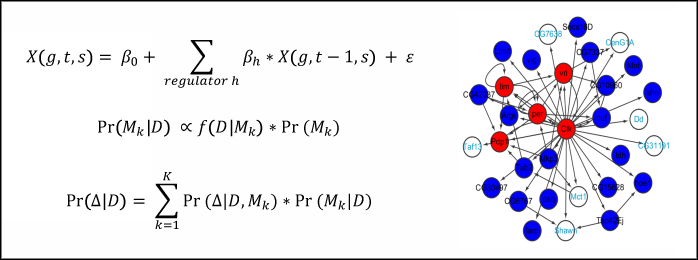
Computation and Systems Modeling Allied Field
Computation and Systems Modeling is the quantitative study of complex problems and systems through the use of mathematics, physics, and computer simulation. Within the Neuroscience major, the Computation and Systems Modeling Allied Field focuses on equipping students with analytical tools that are used to study neural information processing and dynamics, often involving large datasets.
Electives in the Computation and Systems Modeling Allied Field (choose 4 units from the list below, 2 courses which must be 300-level or above).
Courses in the first group are listed separately because they are prerequisites for some of the additional electives in Computation and Systems Modeling.
For ISP students, ISP courses listed below may count toward both ISP requirements and Computation and Systems Modeling.
- MATH 230-1 Multivariable Differential Calculus
- MATH 230-2 Multivariable Integral Calculus
- MATH 240-0 Linear Algebra
- MATH 250-0 Elementary Differential Equations
Any one of the series below is an alternative for the above four classes:
- MATH 281-1, MATH 281-2, MATH 281-3 Accelerated Mathematics for ISP: First Year
- MATH 285-1, MATH 285-2, MATH 285-3 Accelerated Mathematics for MMSS: First Year
- MATH 290-1, MATH 290-2, MATH 290-3 MENU: Linear Algebra and Multivariable Calculus
- MATH 291-1, MATH 291-2, MATH 291-3 MENU: Intensive Linear Algebra and Multivariable Calculus
Projected Annual Course Plans: MATH
Additional electives in Computation and Systems Modeling
- BIOL_SCI 338-0 Modeling Biological Dynamics
- ES_APPM 370-1 may be used as an Allied Field course in CSM or for the Computer Programming requirement, but not both
- ES_APPM 472-0 Introduction to the Analysis of RNA Sequencing Data
- NEUROSCI 390-0-28/NEUROSCI 366-0 Brain Function Through the Lens of Computation (May NOT be double-counted as a Group B in Neuroscience and an allied field).
- MATH 310-1,MATH 310-2, MATH 310-3 Probability and Stochastic Processes
- MATH 311-1, MATH 311-2, MATH 311-3 MENU:Probability and Stochastic Processes
- MATH 325-0 Complex Analysis
- MATH 334-0 Linear Algebra: Second Course
- MATH 351-0 Fourier Analysis and Boundary Value Problems
- MATH 353-0 Qualitative Theory of Differential Equations
- MATH 354-1 Chaotic Dynamical Systems
- MATH 360-1, MATH 360-2 MENU: Applied Analysis
- MATH 368-0 Introduction to Optimization
- MATH 381-0 Fourier Analysis and Boundary Value Problems for ISP
- MATH 382-0 Complex Analysis for ISP
- NEUROSCI 311-0 Biophysical Analysis of Neurons for ISP
- NEUROSCI 366-0 Brain Function Through the Lens of Computation
- NEUROSCI 390-0 Topics in Neuroscience (When taught with topic: "Brain Function Through the Lens of Computation" or "Contemporary Data Analysis in Neurobiology")
- PHYSICS 330-1 Classical Mech
- PHYSICS 330-2 Classical Mechanics
- PHYSICS 332-0 Statistical Mechanics
- PHYSICS 337-0 Physics of Condensed Matter
- PHYSICS 339-1, PHYSICS 339-2 Quantum Mechanics
- PHYSICS 339-3 Particle and Nuclear Physics
- PHYSICS 352-0 Introduction to Computational Physics
- PHYSICS 357-0 Optics Laboratory
- PHYSICS 360-0 Advanced Physics Laboratory
- PHYSICS 361-0 Classical Optics and Special Relativity
- PHYSICS 371-0 Nonlinear Dynamics and Chaos
- STAT 210-0 Introductory Statistics for the Social Sciences
- STAT 232-0 Applied Statistics
- STAT 301-1, Data Science 1 with R or STAT 303-1 Data Science 1 with Python
- STAT 301-2 Data Science 2 with R or STAT 303-2 Data Science 2 with Python
- STAT 301-3 Data Science 3 with R or STAT 303-3 Data Science 3 with Python
- STAT 302-0 Data Visualization
- STAT 320-1, STAT 320-2, STAT 320-3 Statistical Theory & Methods 1, 2, 3
- STAT 328-0 Casual Inference
- STAT 342-0 Statistical Data Mining
- STAT 344-0 Statistical Computing
- STAT 348-0 Applied Multivariate Analysis
- STAT 350-0 Regression Analysis
- STAT 352-0 Nonparametric Statistical Methods
- STAT 354-0 Applied Time Series Modeling and Forecasting
- STAT 356-0 Hierarchical Linear Models
- STAT 383-0 Probability and Statistics for ISP
Projected Annual Course Plans: MATH, PHYSICS, STATISTICS
* Indicates courses for which the Neuroscience major provides pre-registration privileges. Schedule an appointment.
